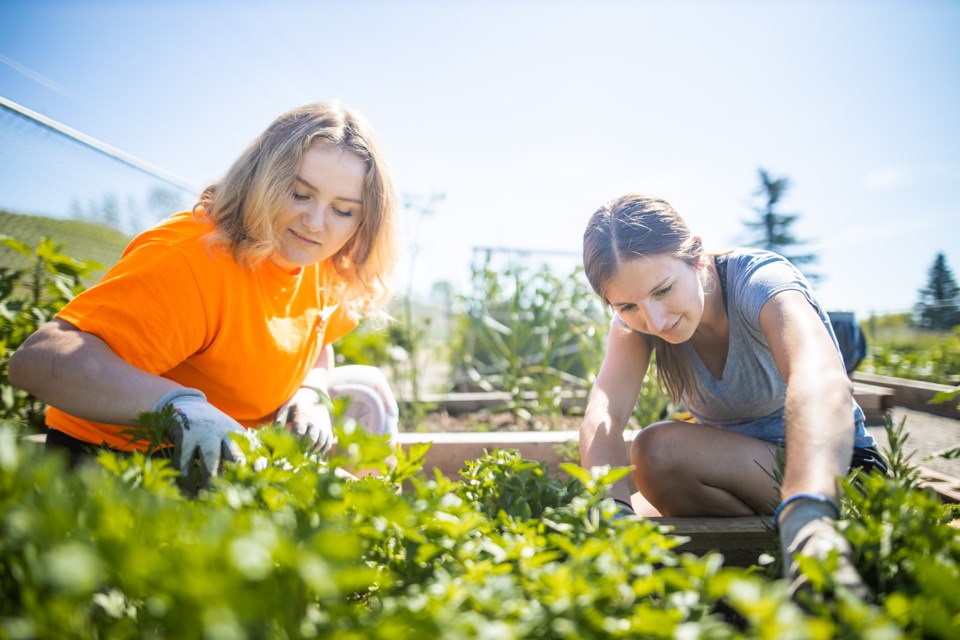Start small and practical and think of the end in mind during southern Alberta’s short growing season.
Colin Russell, a member of the Okotoks Garden Club who has developed a green-thumb for 40 years, presented the dos and don’ts of beginner vegetable gardening via a Zoom conference for the Town of Okotoks’ Growing Veggies 101 Webinar on April 22, quite fittingly Earth Day.
“My initial advice would be simply if you haven’t gardened before start off small, be successful and then grow as you decide you like the activity,” Russell told the digital attendees on Earth Day. “I would caution you about jumping in with too large of a plot to start off with.
“You don’t want to overwhelm yourself, you don’t want to find that this ends up becoming a chore rather than something that you’re enjoying. And think of the end in mind as well, if all of your vegetables are going to come through in September, you’ve got to think about storage and that might feel like work for you as well.”
When picking what to grow it’s important to consider both what you will enjoy eating, what’s difficult or expensive to find at the grocery store and, crucially, what grows well in this climate.
Russell listed unique variations such as purple carrots and golden beets as something that can be challenging to purchase yet simple to grow. Moreover, vegetable such as asparagus and fennel can be pricey at the tills.
The recommended vegetables for beginners from the experienced gardener included beets, lettuce, spinach, carrots, peas, beans, swiss chard, golden zucchini, turnips, green onions and shallots, along with herbs such as mint and chives as well as rhubarb and raspberries in the easy to grow fruit category.
Vegetables to think twice about included the likes of cabbage, cauliflower, celery, potatoes, peppers, parsnips, tomatoes, corn and sweet potato.
Regarding sunlight, Russell said vegetables need a minimum of six hours of direct sunlight, noting that the likes of spinach, carrots, beets, arugula will still grow with less than that amount.
Beginner gardeners will need a few basic tools including spade and fork, trowel, bypass pruner or scissors while Russell also suggested some helpful items including a kneeling pad, weeding tool, light work-gloves, water cans for fertilizing and a garden hoe.
The webinar discussed the effectiveness of raised beds and container gardening.
Raised beds were trumpeted as terrific for improving accessibility for those wheelchair bound or with limited mobility. Other pros included that fewer weeds get into the raised beds.
For those planting in a community garden it’s also important to consider the rules before starting, with some restricting the height of vegetables and the planting of perennials.
Prep work is essential to having a fruitful gardening experience.
Step one is removing weeds and doing so on a regular interval, particularly during the first four to six weeks, Russell said. With clay soil so predominant in the area, it’s important to dig over and break up and as much compost as possible.
The seed versus plant debate was discussed with Russell suggesting seeds are the preferable option in most cases due to the greater availability of different variations and how cost effective the product tends to be, suggesting extra seeds can be kept for years.
He urged that growers must harden off seedling before final transplanting outside as young plants are more prone to frost and heat and should be slowly acclimatized to the outside conditions.
The short growing season sees only an average of 81 frost free days in the Okotoks area, typically from June 10 to Aug. 30. Those dates see rough variations so it’s vital to keep track of frost warnings and if frost comes back into the picture after the plants are in the ground try covering them using cold frames or cloths, floating covers, which also protects from heat, wind and hail.
Other tips from the session included the use of marigolds and herbs such as mint to repel slugs, pets and other bugs, watering regularly with one deep watering per week, one inspection of plants for bugs or nearby weeds per week, thinning out rows and keeping a journal of what works and what doesn’t along with avoiding the use of fresh manure as it presents a risk of E. Coli.
The timing is important to note as Russell stated a common mistake by novice gardeners is planting everything at once which leads to waste. Not harvesting when plants are ready is another potential pitfall for novice green-thumbs.
The Town of Okotoks hosts monthly Green Living Workshops series, this being the first of the digital variety.
“I think it went really well, we had a very good response,” said Jinny Toffelmire, environment and sustainability specialist with the Town of Okotoks. “I would say we had about 25 per cent more than we normally would (in-person).
“I think it was a convenience factor, but I also think that it’s because people are at home more often now and due to the pandemic people are looking for things to do in their own yard and why not grow your own food?”
Toffelmire added the plan is to continue to the workshop series online on a monthly basis.
The full recording and power point presentation from the April 22 webinar is available online at Okotoks.ca/events. Updated information on future events will also be posted on the same link.




